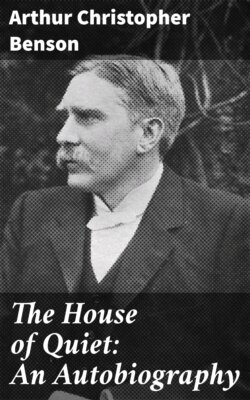Читать книгу The House of Quiet: An Autobiography - Benson Arthur Christopher - Страница 11
На сайте Литреса книга снята с продажи.
5
ОглавлениеTable of Contents
My Mother
My mother, who through the following pages must be understood to be the presiding deity of the scene—O quam te memorem?—how shall I describe her? Seen through her son’s eyes she has an extraordinary tranquillity and graciousness of mien. She moves slowly with an absolutely unconscious dignity. She is naturally very silent, and has a fixed belief that she is entirely devoid of all intellectual power, which is in one sense true, for she reads little and has no taste for discussion. At the same time she is gifted with an extraordinary shrewdness and penetration in practical matters, and I would trust her judgment without hesitation. She is intensely affectionate, and has the largest heart I have ever known; but at the same time is capable of taking almost whimsical prejudices against people, which, however I have combated them at the time, have generally proved to be justified by subsequent events. Her sympathy and her geniality make her delightful company, for she delights in listening to the talk of clever people and has a strong sense of humour. She likes being read to, though I do not think she questions the thought of what is read. She is deeply religious, though I do not suppose she could give a reason for her faith, and is constantly tolerant of religious differences which she never attempts to comprehend. In the village she is simply adored by men, women, and children alike, though she is not particularly given to what is called “visiting the poor.”
At the same time if there is trouble in any house, no matter of what kind, she goes there straight by instinct, and has none of the dread of emotional scenes which make so many of us cowards in the presence of sorrow and suffering. I do not think she feels any duty about it, but it is as natural and spontaneous for her to go as it is for most of us to desire to keep away. A shrewd woman of the village, a labourer’s wife, whom my mother had seen through a dreadful tragedy a year or two before, once said in reply to a question of mine, “It isn’t as if her ladyship said or did more than any one else—every one was kind to us—but she used to come in and sit with me and look at me, and after a little I used to feel that it was all right.”
She manages the household with less expenditure of trouble than I have ever seen. Our servants never seem to leave us; they are paid what many people would call absurdly high wages, but I do not think that is the attraction. My mother does not see very much of them, and finds fault, when rarely necessary, with a simple directness which I have in vain tried to emulate; but her displeasure is so impersonal that there seems to be no sting in it. It is not that they have failed in their duty to herself, but they have been untrue to the larger duty to which she is herself obedient.
She never seems to labour under any strong sense of the imperative duty of philanthropic activity—indeed it is hard to say how her days are filled—but in her simplicity, her unselfishness, her quiet acceptance of the conditions of life, her tranquillity and her devoted lovingness she seems to me the best Christian I have ever seen, and to come nearest to the ideals of Christ. But, though a large part of her large income is spent in unostentatious benevolence, she would think it preposterous if it were suggested to her that Christianity demanded an absolute sacrifice of worldly possessions. Yet she sets no store on comfort or the evidences of wealth; she simply accepts them, and has a strong instinctive feeling of stewardship.
I cannot help thinking that such women are becoming rarer; and yet it is hard to believe that they can ever have been other than rare.
